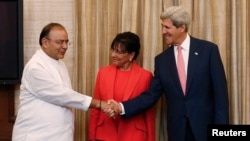At the conclusion of a strategic dialogue between India and the United States, both countries expressed optimism about improving their ties.
After discussing issues ranging from trade and security to climate change with his Indian counterpart, U.S. Secretary of State John Kerry said that India and the U.S. can become “indispensable partners” in the 21st century.
“The moment has never been more ripe to deliver on the incredible possibilities of the relationship between our nations," said Kerry.
The fifth round of the India-U.S. Strategic Dialogue on Thursday was the first high-level interaction between American officials and India’s new government, installed in May.
The visit is seen as an effort to reverse a downward spiral in bilateral ties.
With a range of differences on issues such as trade, tariffs and price controls, Kerry said that there is work to be done.
“The words are easy. It is the actions we need to take that will really define the relationship in the days ahead. And I think it is safe to say that I said to the foreign minister, that we all have a lot of homework to do," he said.
Washington’s chief concern remains barriers to trade by India.
These barriers were a focus during Kerry’s visit. His meetings with Indian officials took place as a deadline loomed over a global trade deal, which India has opposed unless its concerns are met on the right to buy grain from farmers at above-market prices, and stockpile it.
Kerry urged India to join the agreement at the World Trade Organization. He said he understood India’s concerns about providing food security to large number of poor people, but warned that it could stand to lose if the trade deal was scuttled.
Meanwhile, India has blocked world trade reforms over demands it be allowed to sell stockpiled food to the poor at subsidized prices.
Delegates at a World Trade Organization meeting in Geneva say they missed a deadline for passage of the reforms, saying consequences could be significant.
WTO members agreed in principle last year to streamline and standardize global customs rule.
India, however, said it would not back the trade reforms unless it were allowed to have the right to buy grain from farmers at above-market prices, stockpile it, and sell it to the poor at government-subsidized prices.
WTO rules say stockpiled food can only be sold at market prices.
U.S. Trade Representative Michael Froman said the customs reforms would have cut trade costs and generated hundreds of billions of dollars in much needed economic activity.
Froman said he is disappointed India and its supporters decided not to adhere to their commitments.
He said the United States will consult with its trading partners on the next step.
Despite the differences, both sides are keen to collaborate in a range of areas as India focuses on development goals and has indicated that it will undertake more economic reforms.
The U.S. secretary of state said there are “dramatic” opportunities in sectors such as high-end manufacturing, infrastructure, health care, and information technology, where American companies are world leaders and where India is seeking both investment and technology.
Kerry will meet on Friday with Prime Minister Narendra Modi, who is scheduled to visit Washington in September.




